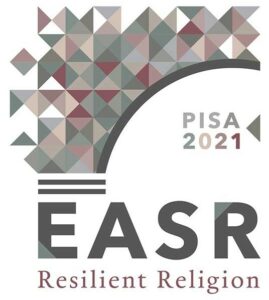
18th annual Conference of the European Association for the Study of Religions (EASR)
Pisa, August 30 to September 3, 2021
Topic: Resilient Religion
Minutes of the EASR General Assembly 2021 in Pisa
Note: In the interest of the health and safety of the participants, in light of the challenges brought about by the COVID19 pandemic, the event was organised in a hybrid form and streamed online.
Resilience can be considered as the ability to counteract or absorb a process of transformation. It is also characterized by a capacity to endure changes without having to adapt permanently, an ability to find what best suits new environmental conditions; and an awareness of how to cope with a crisis. In this sense, religion – whether in its institutionalized forms or just as a simple belief in any relationship with a super-human agency – represents a powerful tool for reacting to difficult situations and establishing a relationship with the sacred thanks to the interaction between spirituality, mindfulness, empathy and the emotions.
On the one hand, religiousness can play a significant role as a response to major life stressors, thus representing a significant resilience factor for many people, as well as helping people to sustain their relationship with superhuman agents. On the other hand, religion has not withered away because of secularization and its offshoots. Quite the contrary, a reframing and concomitant transformation of religion is taking place through the negotiation and incorporation of new media, so that religion can prove to be itself resilient.
Similarly, concepts such as crisis, revolution or progress, which recur in different periods and contexts and which also play an important role in religions, can be understood as an interaction between the two antithetical (and yet interrelated) concepts of resilience and acceleration, either in historical time and/or geographical contexts, where the simultaneous presence of the two aspects can be observed. Even the mere cognizance of a change, which sometimes is only perceived and not entirely coincident with the actual change, can lead to a definitive transformation and show a causal interconnection between different structures.
The conference aims at focusing on the role played by religion as a resilient tool or as a tool for resilience. Interventions are welcome that focus on theoretical questions or on in-depth analysis of case studies of particular relevance, appealing to scholars from many fields, such as religion, anthropology/sociology, history, senses, and globalization.
